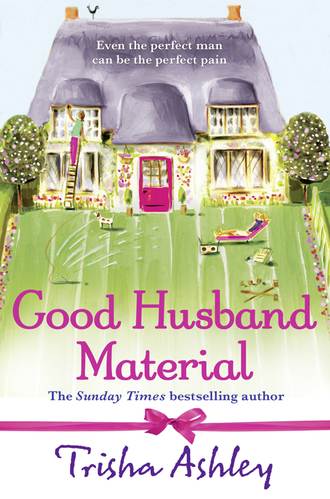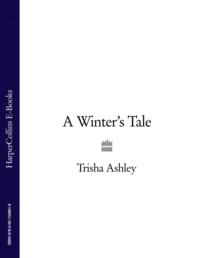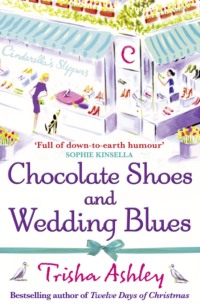
Полная версия
Good Husband Material

TRISHA ASHLEY
Good Husband Material

Copyright
AVON
An imprint of HarperCollinsPublishers Ltd
77–85 Fulham Palace Road
Hammersmith, London W6 8JB
www.harpercollins.co.uk
First published in Great Britain by Judy Piatkus (Publishers) Ltd in 2000
This edition published in Great Britain by HarperCollinsPublishers in 2013
Copyright © Trisha Ashley 2000
Trisha Ashley asserts the moral right to be identified as the author of this work.
A catalogue record for this book is available from the British Library.
This novel is entirely a work of fiction. The names, characters and incidents portrayed in it are the work of the author’s imagination. Any resemblance to actual persons, living or dead, events or localities is entirely coincidental.
All rights reserved under International and Pan-American Copyright Conventions. By payment of the required fees, you have been granted the nonexclusive, nontransferable right to access and read the text of this e-book on-screen. No part of this text may be reproduced, transmitted, downloaded, decompiled, reverse-engineered, or stored in or introduced into any information storage and retrieval system, in any form or by any means, whether electronic or mechanical, now known or hereinafter invented, without the express written permission of HarperCollins.
Source ISBN: 9781847562814
Ebook Edition © March 2013 ISBN: 9780007494088
Version: 2014-07-25
Dedication
For Mary Turner Long, with love.
Table of Contents
Cover
Title Page
Copyright
Dedication
Prologue
Chapter 1: A Dream of a Man
Chapter 2: Home, James
Chapter 3: Painted Out
Chapter 4: Wild in the Country
Chapter 5: The Bourgeois Bitch
Chapter 6: The Posy Profligate
Chapter 7: Drained
Chapter 8: Busted Flush
Chapter 9: Nutthill Nutria
Chapter 10: Just Award
Chapter 11: Nasty in the Woodshed
Chapter 12: Mayday!
Chapter 13: And the Beet Goes on
Chapter 14: In the Drink
Chapter 15: Brief Encounter
Chapter 16: Cat’s Paw
Chapter 17: A Fête Worse than Death
Chapter 18: Fencing
Chapter 19: One Big Ham
Chapter 20: No Change
Chapter 21: Through a Glass, Darkly
Chapter 22: Bugged
Chapter 23: Love Goes West
Chapter 24: Reciprocations
Chapter 25: Blood and Roses
Chapter 26: Pregnant Pause
Chapter 27: Similar Conditions
Chapter 28: Bonfire of the Vanities
Chapter 29: The Great Castrator
Chapter 30: Pupped
Chapter 31: The Least Little Thing
Chapter 32: Tie-dyed
Chapter 33: Christmas Spirit
Chapter 34: Twinkle,Twinkle
Chapter 35: Uncertain Appetites
Chapter 36: Guilt-edged
Chapter 37: The Sweet Wine of Love
Chapter 38: Unlicensed Behaviour
Chapter 39: Dress Optional
Chapter 40: Sold a Pup
Chapter 41: Green-Eyed Men
Chapter 42: Mirror, Signal, Manoeuvre
Chapter 43: Out of the Dark
Chapter 44: Aftershock
Chapter 45: Issues
Chapter 46: Alignments
Chapter 47: Photo Finish
Chapter 48: Besieged
Keep Reading
Acknowledgements
About the Author
Also by the Author
About the Publisher
Prologue
‘The lyrics of the new Goneril single, ‘Red-Headed Woman’, taken from the album of the same name, show a searing agony of loss and grief. Singer/songwriter Fergal Rocco plumbs new depths of helpless agony and despair in a voice that seems to have been created for that very purpose.’
New Musical Express
Fergal: 1986
My first brief glimpse of Tish seems to have been indelibly imprinted on the inside of my eyelids, for even after almost twelve years and God-knows-how-many women, I only have to close my eyes and there she is: a dryad poised far above me in the shivering green oak leaves, stretching forward with one hand reaching out, her expression intent.
Then the sharp crack as the branch gives way beneath her weight, precipitating her into a long downward swoop towards me, apricot hair flying behind her like a wild Renaissance angel – a mermaid swept by the glassy green waves – a ship’s figurehead forging ahead, one out-thrust hand clasping—
Well, not a trident, at any rate, only some small grey thing. It didn’t just then make the same impression that Tish was about to: a bolt from the green.
While I’d like to say I caught her, truth compels me to admit I merely broke her fall, ending flat on my back with the angel sprawled across me. Enormous smoke-grey eyes stared apprehensively down into mine from an inch away. I decided to give in without a struggle.
Then something scuttled shiftily up my arm on hot, pronged feet and bit me savagely on the ear.
I swore and the creature let go and gave an evil laugh.
I’m not joking.
When Dad came round the corner of the house to see what all the noise was, he found the angel still sprawled over me, incoherently apologising and dabbing at my bleeding ear with a wadded-up bit of filmy skirt.
A small, evil-looking grey parrot stood nearby (too near) regarding us with interested, mad eyes.
‘Always Fergal catches the girls,’ Dad said cheerfully, taking the scene in his stride. Then, with his usual aplomb, he removed his jumper and enveloped the parrot in its folds.
The small assassin gave a dismal squawk, echoed by a screech of outrage from behind us. A tiny, well-preserved blonde, like a piece of shellacked fluff, was advancing up the drive with the martial air of one about to rescue her daughter’s honour or die in the attempt.
‘Leticia – get up at once!’
‘Leticia?’ I questioned incredulously, looking up into the grey eyes so close to mine. (And feeling as I did so as if I’d been sucked into a Black Hole and squeezed out on the other side like toothpaste.)
Her hand stopped its rather painful and ineffectual dabbing and she glared. ‘I don’t see that Fergal is any better!’ she said defensively. ‘And anyway, I’m always Tish.’
‘And I’m always Fergal, Angel, so you’ll just have to get used to it.’
Her eyes widened slightly, then she suddenly removed herself from me in a flutter of flowing green fabric (no wonder I hadn’t seen her in the tree) planting her knee unintentionally – I hope – in a delicate part of my anatomy in the process.
‘Leticia is a nice name,’ Dad said interestedly, giving it an Italian pronunciation. ‘And I am Giovanni Rocco, your new neighbour – call me Joe, everyone does. For six months only we rent this house while our own is renovated – the cracks appear, these old houses in London, they are not well built. And this must be your mamma?’
‘I am Mrs Norwood,’ the fluffy little blonde lady said icily, eyeing Dad with the dubiously surprised expression of one meeting a tall, blond, green-eyed Italian for the first time. (My Mediterranean darkness I owe entirely to my Irish mother.)
‘So pleased to meet you – and your charming daughter. This is my eldest son, Fergal. I have four sons and one daughter. Perhaps you have heard the youngest ones playing in the garden? They love this big garden.’
‘Yes, I have heard them. Normally this is such a quiet, select neighbourhood.’
The girl turned pink and began nervously to pleat the folds of her bloodied skirt. ‘I – I like to hear children playing,’ she ventured shyly. ‘I’m glad to meet you, Mr Rocco.’
‘Joe.’
‘Joe,’ she amended. ‘And I’m so sorry my parrot bit your son, only he escaped, you see, and I was trying to catch him.’
I hauled myself up from where I’d been sitting on the grass, stunned in more ways than one, and the blood dripped down my once-white T-shirt.
‘Oh dear,’ she said guiltily. ‘But it’s only a little bite. Ears bleed a lot, don’t they?’
‘Mine certainly seems to,’ I agreed, smiling down at her, and she blushed again and looked away. ‘Perhaps you should come round later and see how I am?’ I added cunningly.
‘Yes, come for dinner,’ said Dad expansively. ‘I stay home tonight, so I will cook – and what is one or two more? You too, Mrs Norwood, and Mr Norwood, of course.’
‘I am a widow. And I am afraid I am otherwise engaged. And Leticia—’
Seeing she was about to scupper any designs I might have on the angel I interrupted rudely, ‘There’s some disease you can catch from parrots, isn’t there? Psittacosis? Tish really ought to come and check on me.’
‘I … is there?’ stammered Tish, looking frightened. ‘Oh dear, then perhaps I had! And you will put some antiseptic on it right away, won’t you?’
‘You can check on that, too – in about an hour?’
She nodded, still looking frightened, until I winked at her, when she blushed again and glanced away, stifling a giggle.
‘Leticia!’ began Mrs Norwood in a hectoring voice. ‘You—’
Whatever she was about to say was silenced by Dad helpfully shoving the wrapped, protesting bundle of parrot into her arms and tucking the jumper as carefully around it as though it were a baby.
She looked even more aghast than she’d done when she saw her daughter entwined with me on the grass, and they both retreated down the drive, accompanied by muffled squawks.
‘Such a pretty girl,’ Dad said appreciatively. ‘So tall and slender, and the hair like sun-warmed apricots. But very young, Fergal – maybe only sixteen or seventeen. The mamma is right to be careful.’
She was only seventeen, and I was her first love, but I was twenty-two and should have known that, for her, it wouldn’t last for ever.
I suppose I was lucky it lasted a year.
Chapter 1: A Dream of a Man
November 1998
Last night I dreamed I was back in Fergal’s arms.
Nothing new there, then.
I often dream about the current heroes of the romantic novels I write, who all bear a definite (physical) resemblance to Fergal. The sort of dreams that make you wake up and feel guilty when you look at your husband.
They certainly add some oomph to my love scenes, though unfortunately only the ones in my novels. I’ve come to the conclusion it would take a lot more than that to add any oomph to James.
This time the dream was of a different genre, more like a rerun of my last encounter with my first untrue love. Maybe my subconscious thought I didn’t suffer enough at the time and decided to run it past me again.
Anyway, there we were entwined like Laocoön in Fergal’s beloved second-hand Frog-eyed Sprite sports car (thoroughly cleaned inside and out with anti-bacterial cleanser by myself when he bought it, of course – after all, who knew where it had been?). Birds were singing, the sun was shining and there was a heady smell of engine oil, old leather and disinfectant … and the equally heady feel of his arms around me as he said confidently in my ear, ‘Goneril are going to make it big this time!’
Goneril was (and still is) the name of the rock band he’d formed together with his brother Carlo and a motley assortment of other art students. Why they had to choose a name that sounds like a venereal disease, I don’t know.
In the year I’d been going out with Fergal the band had gone from being a casual thing they did for fun and to earn some money, to the point of taking over more and more of their lives and time. And now they’d just been asked at the last minute to go on tour as support to a well-known group, the original support band having pulled out.
It meant leaving for the USA almost immediately: make-or-break time.
I looked up into his amazing green eyes and said adoringly, ‘Oh, Fergal, of course you’ll make it! But – I’ll miss you while you’re abroad.’
He pulled away slightly at this, his straight black brows drawn together in a frown. ‘Why should you miss me?’
‘Of course I’ll miss you. You’ll be away for months!’
‘But – you’re coming with me, Tish! I want you with me.’
Gobsmacked wasn’t in it. ‘M-me?’ I stammered. ‘Go on tour with you? But I can’t do that, Fergal – my university course starts in September. Besides, Mother would have a fit if I trailed around after you like a groupie. And, by the way, you never asked me!’
Fergal’s always volatile temper got the better of him at this point and he gave me a little shake. ‘You are my girl, not a groupie, and I want you with me. And why go to college? What does it matter?’
‘What does it matter when you’ve got me?’ was what he really meant, and it made me see red.
‘Of course it matters! I’m looking forward to the course.’
Well, I had been until then.
Fergal had just finished his MA in Fine Art at the RCA, and the plan was that he should make a name for himself with his painting while I got my degree, so that one day we could live in the country together. He would paint and I would write poetry …
Daydreams – but anything seemed possible when I was with Fergal. And of course I hadn’t then realised that although I was a poet, I was not a good poet.
The fine distinction between turning out reams of seamless drivel like a miniature stream-of-consciousness novel and writing real poetry is sometimes hard for a teenager to grasp. My literary skills, I later discovered, lay elsewhere.
But at the time I was all set to study Modern English Literature in pursuit of this, and I thought he should understand, since he seemed just as dedicated to painting until Goneril started to take off.
‘Well – have a year out, then,’ he suggested impatiently. ‘Isn’t it about time you left home and experienced some real life?’
That would look good on my gap-year CV: ‘What did you do in your gap year, Miss Norwood?’ ‘Oh, I just screwed my rock-singer boyfriend over an entire continent. Nothing interesting.’ ‘And was that with the VSO, Miss Norwood?’ etc.
As to experiencing real life, I’d packed more of that into that year with Fergal than I had in all the previous seventeen.
I looked at him in exasperation … and my heart softened a bit. He was absolutely gorgeous, and I loved him so much. But when I remembered how casually he’d assumed I’d just follow him like a little dog at the asking – or the telling – I got angry all over again.
‘Look, Fergal, I’ll be waiting here for you when you come back: it’s not even as if I’m going away to college.’ (And that was solely to be near him. Otherwise I would have applied for something as far away from Mother as possible – the University of Outer Mongolia Scholarship in Non-Rhyming Glottal Stops, say.)
He held me at arm’s length from him, his fingers biting into me. ‘Come with me or that’s it – finish!’
His eyes were as hard and cold as emeralds in his dark face.
Then I lost my temper and in a state of hurt fury said a few cutting things about how easy he’d found it to abandon his art for Filthy Lucre (well, I was only eighteen and a bit idealistic) and then we had our worst row ever. It wasn’t followed by the sort of making-up that healed such spats either, since he took me straight home and dropped me at the gate without another word.
Even then I didn’t think he meant it – he was inclined to say that sort of thing in the heat of the moment – but by next day, when he hadn’t phoned to apologise, I started to get worried and even seriously contemplated abandoning my pride and ambitions and going with him after all. So maybe it wouldn’t last for ever, but wouldn’t it be better to have loved and lost than not to have loved at all?
Who knows what might have happened if poor Grandpa hadn’t had his heart attack that day, so that instead of chewing my fingernails by the telephone I was travelling to Granny’s?
In the end I was there for the whole summer: through the struggle that Grandpa fought and lost, and that of my down-to-earth and stoical grandmother to come to terms with her bereavement.
Mother was entirely useless, of course. She produced one excuse after another as to why she couldn’t come up to lend her support, and then crowned it all by being ‘too prostrate with grief’ to attend the funeral.
‘The woman’s got the backbone of a wet lettuce,’ commented Granny when I told her, and I was glad to see some slight return of her spirits.
Although Mother always disliked Fergal I had extracted a promise from her before I left to tell him where I was if he should ring, and to send on all my mail. But, as she almost gleefully reported, there was nothing to send on: he never contacted me again.
He’d meant what he said after all.
The coup de grâce was a picture cut from a gossip magazine and helpfully forwarded by Mother showing Fergal coming out of some American nightclub with a well-known and beautiful model draped all over him like clingfilm.
I was so devastated I prayed nightly that she would stab him to death in bed with her hipbones, but nothing happened, except that Mother kept sending me cuttings about all the scandalous things Fergal and the rest of the group got up to, until I told her that I didn’t want to know. I didn’t even want the name Fergal mentioned ever again. I hadn’t got time to have a broken heart that summer.
I’d adored Grandpa, and he and Granny had been a mismatched but devoted pair, so I threw myself into helping her in any way I could.
But somehow all the colour seemed to have bled away from my surroundings; having your first close experience of death and your heart broken simultaneously does that, I find. So when Granny decided, in an old-fashioned sackcloth-and-ashes way, to dye every garment she possessed (plus the inside of the washing machine) black, I put all the clothes I had with me in too.
I’d found this dyeing of the clothes a very dramatic gesture – the Dying of the Light, as it were – and I wore nothing but black for years. After all, it stopped all that bother about wondering what to wear, and matching things up, which I really didn’t care about any more. There is only one drawback I discovered with black – you can never see whether it is spotlessly clean or not. Wearing black became a habit, one I only really started to break when Mother pointed out that you can’t get wedding dresses in that colour.
When I finally went home from Granny’s I didn’t dye anything else black, just cut all the rest of my clothes up into little pieces – six-inch, three-inch and one-inch, so as not to waste any – and began on my hobby of patchwork.
But my experience with Fickle Fergal at least made me appreciate James’s steadier, mature qualities when I met him, so I’ve no regrets now over what happened so long ago.
And, look on the bright side, at least I didn’t wake up after this dream feeling guilty: just angry and tear-stained.
I gave James a poke in the ribs with my elbow, handed him a cup of coffee-bag coffee from the Teasmade, and informed him that it was time to get up.
Isn’t it strange that I should hate tea when I adore autumn leaves? But I find I don’t wish to drink dead leaf dust.
‘Day off,’ James grunted, trying to put his head under the duvet.
‘Day off to house-hunt, and I’ve got a feeling we’ll find the country cottage of our dreams today – we’ve just been looking too near London and in the wrong direction. Besides, a day in the country will do us both good. All the leaves have turned gold now, and—’
‘You’ve got enough leaves,’ he said hastily, re-emerging.
I don’t know why he disapproves of my harmless little hobbies. My patchwork brightens the whole flat up; it’s amazing just how much you can make from a wardrobe of old clothes. I’m still at it after all this time, and I’m sure the acreage is more than the sum of the original. Can this be possible? Algebra was never my strong point. Or do my clothes have a Tardis-like quality?
And my leaf collection: James had never minded going for walks in the park or the country while I collected them when we first started going out together, though it transpired that he thought I was going to press them. (And put them in an album perhaps? I know he’s quite a bit older than me, but that’s Victorian!)
‘Oh, no,’ I’d told him at the time, surprised. ‘I like them all curled and natural as they fall. I spread them out to dry, then give them a light coat of acrylic varnish.’
‘Varnish?’
‘They get dusty. This way I can rinse them off.’
‘Oh,’ he’d said, obviously struggling with this concept. Tentatively he’d enquired, ‘Then I suppose you make arrangements or pictures or something with them?’
‘No, I usually just pile them up in baskets and along the window ledges in my room. I like the whispering sound they make when I go in and out.’
He’d given me an affectionate squeeze and said fondly, ‘What funny ideas you have, darling – it must be living alone for so long.’
‘Oh, no, I’ve always had them,’ I’d assured him, only until then I hadn’t thought my little ways were funny.
Still, you can see how harmless my hobbies are, really.
‘I need some more oak leaves, James,’ I told him now. ‘I never seem to find enough of those, and I’d like a whole basketful.’ (I’m a basket person but not, I hope, a basket case, whatever James might imply.)
‘You know, I can’t think why everyone doesn’t collect them – they’re free, in beautiful colours and shapes, and perfectly hygienic if you varnish them.’ (I only collect clean-looking ones anyway, but you can always wipe them over with Dettox.) ‘Isn’t it strange we don’t value them? We could use them as money instead of a lot of germy bits of paper, or—’
There was a gusty sigh from under the bed, which heaved two or three times as if in a heavy swell and I broke off to exclaim indignantly, ‘You let that stupid dog in again last night, didn’t you? You know I don’t like breathing the same air in and out all night, it isn’t healthy. Or hygienic. You’d better get up and take her out so we can get off early.’
‘Plenty of time,’ he muttered, but determinedly I prised him out, assisted by the lure of stopping off for a fat-and-cholesterol-rich breakfast en route.
Fergal: 1998
‘DOES BRITAIN’S SEXIEST ROCKER HAVE A SAD PAST?’
Trendsetter magazine
Past is the operative word. And while I don’t think I could forget Tish if I tried, I don’t try, just go on rubbing salt into the old wound so that it never entirely heals.
Angst is so good for an artist …
My immaculate, fiery angel is the muse I still draw on for inspiration for both songs and paintings alike.
But that’s the Tish I remember. She’s probably Mrs Suburban Housewife now, her dreams stuffed into a drawer to moulder. (Or smoulder – she had a way with words.)









